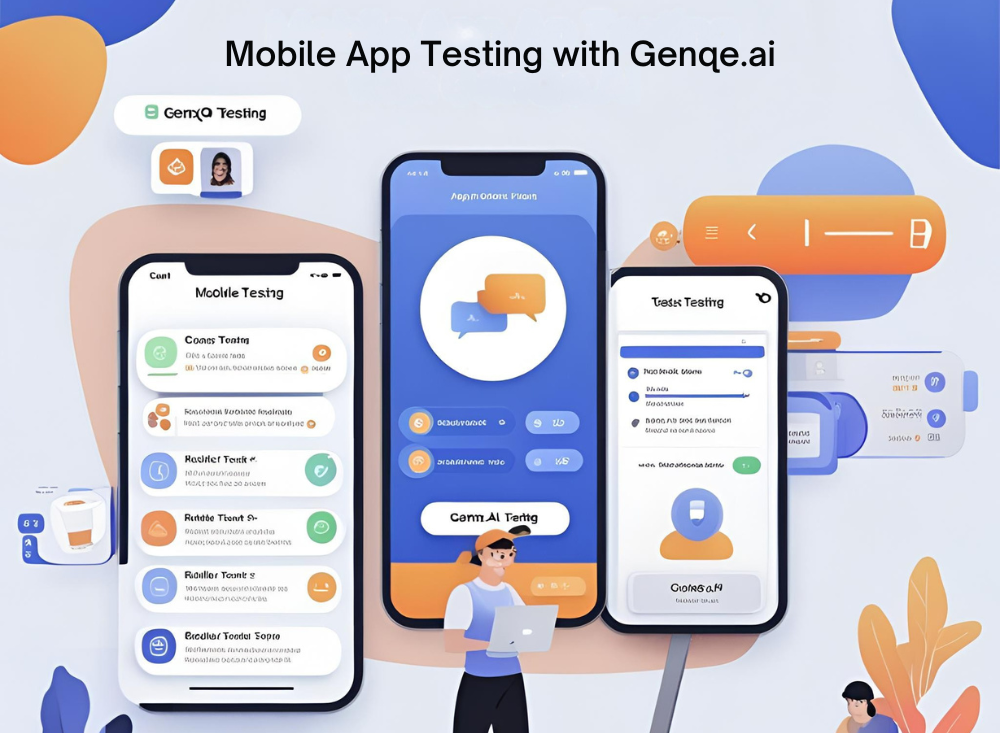
In today’s fast-paced digital world, delivering a high-quality mobile app is critical to success. Mobile app testing ensures your app is functional, user-friendly, and secure before it reaches your audience. With Genqe.ai, an AI-powered testing platform, you can streamline this process, making it faster, more efficient, and highly effective. This guide walks you through the step-by-step process of mobile app testing and explores the various types of testing, all enhanced by Genqe.ai’s innovative capabilities.
Why Mobile App Testing Matters
Mobile app testing is essential to catch bugs, optimize performance, and ensure a seamless user experience across diverse devices, operating systems, and network conditions. Poorly tested apps can lead to crashes, negative reviews, and user churn. By leveraging Genqe.ai, you can automate and optimize testing workflows, reducing manual effort and ensuring consistent quality.
Step-by-Step Mobile App Testing Process with Genqe.ai
Step 1: Define Testing Objectives and Scope
Start by identifying your app’s core functionalities and user requirements. Define clear, measurable goals, such as validating payment systems, ensuring UI consistency, or optimizing performance under high loads. With Genqe.ai, you can input high-level objectives in natural language, and its intelligent test planner will automatically generate test cases tailored to your app’s needs.
Step 2: Create Comprehensive Test Cases
Develop detailed test cases covering all app functionalities, including positive, negative, and edge-case scenarios. Genqe.ai simplifies this by using AI to generate test cases based on your app’s requirements or user stories. For example, input a description like “Test the login functionality,” and Genqe.ai will produce step-by-step test cases, including expected outcomes, saving you time and ensuring thorough coverage.
Step 3: Set Up the Testing Environment
Configure the testing environment to mirror real-world conditions, including various devices, operating systems (iOS, Android), and network speeds (3G, 4G, Wi-Fi). Genqe.ai integrates with cloud-based testing platforms, providing access to a wide range of virtual and real devices. This ensures your app is tested across diverse configurations without the need for physical hardware.
Step 4: Execute Tests (Manual and Automated)
Decide whether to perform manual or automated testing based on your app’s complexity and testing goals. Genqe.ai excels in automating repetitive tasks, such as functional and regression testing, while allowing manual testing for exploratory or UI/UX scenarios. Its AI-driven test execution selects the most relevant test suites, reducing testing time and improving accuracy.
Step 5: Defect Reporting and Management
During testing, identify and log defects using Genqe.ai’s advanced defect analysis tools. The platform provides detailed reports with screenshots and logs, making it easy to pinpoint issues. Genqe.ai’s AI also suggests fixes and prioritizes defects based on severity, streamlining communication with developers.
Step 6: Perform Regression Testing
After fixing bugs or adding new features, re-run critical test cases to ensure no new issues have been introduced. Genqe.ai’s smart versioning and self-healing test scripts automatically adapt to app changes, ensuring regression tests remain relevant and reducing maintenance efforts.
Step 7: Review and Optimize the Testing Process
Document test results, analyze performance metrics, and gather user feedback to refine your testing strategy. Genqe.ai generates comprehensive reports that visualize test coverage and highlight areas for improvement, enabling continuous optimization of your testing workflow.
Types of Mobile App Testing with Genqe.ai
To deliver a robust app, you need to conduct various types of testing. Genqe.ai supports the following testing types, enhancing efficiency and accuracy:
1. Functional Testing
Ensures all app features work as intended. Genqe.ai automates functional test case creation and execution, validating user flows like login, search, or checkout processes across platforms.
2. Performance Testing
Evaluates app responsiveness, stability, and resource usage under different conditions. Genqe.ai measures metrics like startup time, battery consumption, and API call performance, ensuring your app performs smoothly.
3. Usability Testing
Assesses the app’s user-friendliness and overall experience. While manual testing is often used for subjective feedback, Genqe.ai’s AI can simulate user interactions to identify usability issues.
4. Compatibility Testing
Verifies app performance across various devices, OS versions, and screen sizes. Genqe.ai’s cloud-based testing ensures comprehensive coverage without the need for physical devices.
5. Security Testing
Identifies vulnerabilities like data leaks or unauthorized access. Genqe.ai’s AI-powered testing tools simulate security threats and ensure compliance with regulations like GDPR and CCPA.
6. Localization Testing
Ensures the app adapts to different languages, regions, and cultural conventions. Genqe.ai automates localization test case generation, verifying content and formatting for global audiences.
7. Installation Testing
Validates smooth installation, updates, and uninstallation processes. Genqe.ai automates these tests, ensuring compatibility with various app stores and devices.
Best Practices for Mobile App Testing with Genqe.ai
- Leverage AI Automation: Use Genqe.ai’s AI to automate repetitive tasks, freeing up time for creative and exploratory testing.
- Test on Real Devices: Combine Genqe.ai’s cloud-based testing with real-device validation for accurate results.
- Prioritize User Experience: Use Genqe.ai to simulate real-world user interactions and optimize UI/UX.
- Integrate with CI/CD: Seamlessly integrate Genqe.ai with your CI/CD pipeline for continuous testing and faster releases.
- Monitor Continuously: Use Genqe.ai’s reporting tools to track performance and improve testing strategies over time.
Why Choose Genqe.ai for Mobile App Testing?
Genqe.ai revolutionizes mobile app testing with its AI-powered features, including:
- Intelligent Test Case Generation: Creates comprehensive test cases from natural language inputs.
- Self-Healing Scripts: Automatically adapts to app changes, reducing test maintenance.
- Cloud-Based Testing: Provides access to diverse devices and configurations.
- Detailed Reporting: Offers actionable insights with screenshots and logs for quick issue resolution.
- Integration Capabilities: Works seamlessly with tools like Jira, Slack, and GitHub for streamlined workflows.
By incorporating Genqe.ai into your testing process, you can ensure your mobile app is robust, user-friendly, and ready for the market. Whether you’re building a native, hybrid, or web app, Genqe.ai’s AI-driven approach simplifies testing, saves time, and delivers exceptional quality.
Ready to elevate your mobile app testing? Explore Genqe.ai today and transform your QA process!